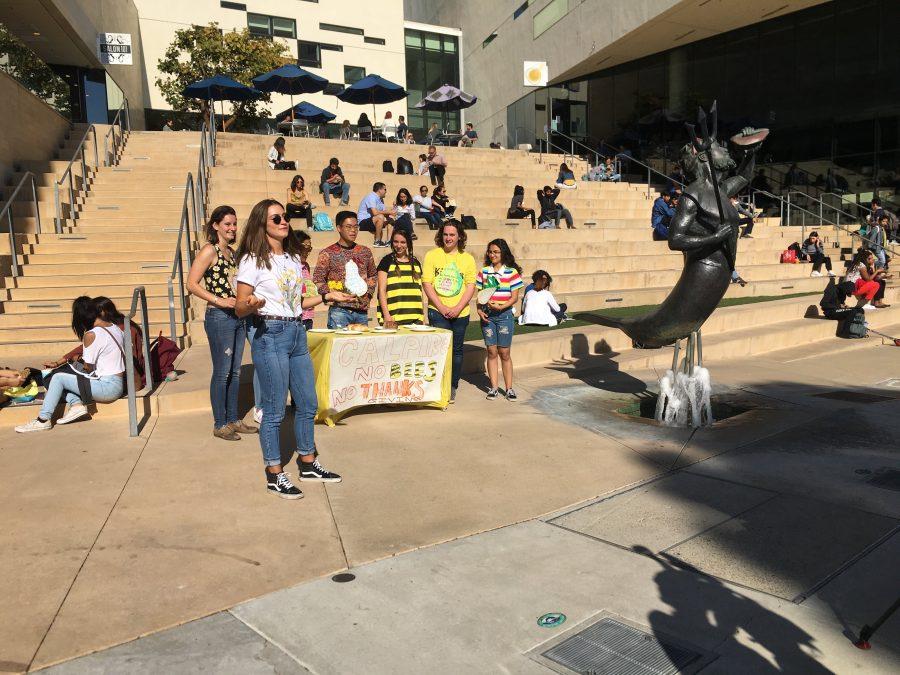Students in the UC San Diego chapter of the California Public Interest Research Group held a small press event on Tuesday, Nov. 20, highlighting the necessity of bees in cultivating many food products. Holding the event during the weekly farmers’ market in Matthews Quad just two days before Thanksgiving, the group hoped to bring attention to the crisis of large populations of bees dying off to both students and farmers. The event is a part of CALPIRG’s statewide campaign to ban neonicotinoid-based pesticides.
CALPIRG set up a table near the Triton statue, displaying what a Thanksgiving dinner would look like without food products that are dependant on pollination. The only foods on the table were meats and bread, and several empty plates were on display.
Emma Youngquist, CALPIRG’s media intern for the Save the Bees campaign, explained the organization’s tactic to the UCSD Guardian.
“With Thanksgiving coming up, people are real excited to be going home, but a lot of them don’t really think about the things they kind of take for granted like pumpkin pie or brussel sprouts or cranberries,” Youngquist said. “Without pollinators, most of our Thanksgiving table would just be meat and bread.”
The Environmental Protection Agency cites a number of factors in colony collapse, or mass disappearance of worker bees in a hive. Among these factors are invasive mites, poor nutrition or environmental stressors on bees. Youngquist noted that while there are a number of different reasons attributed to major colony collapse, the campaign’s main focus is on the use of neonicotinoids, or nicotine-based pesticides.
“Neonics are a nicotine-based pesticide that is still being used in the state of California, even though it’s already been banned in the [European Union],” Youngquist said. “They’re really harmful to bees. They are shown to lower [bees’] reproductive rates and induce paralysis and death of insects.”
The California Department of Pesticide Regulation, a board and department of the California Environmental Protection Agency, began refocusing its evaluations in 2009 to determine the effects of certain neonicotinoid pesticides on essential pollinators, such as bees.
In January, the department announced that it would no longer consider any applications by pesticide companies that would expand the use of neonicotinoid pesticides in the state.
According to CDPR, there are more than 2.5 million honey bee colonies in the U.S. that pollinate an estimated $15 billion of crops each year. Approximately 1.8 million of those colonies are used each year in California to pollinate the state’s almond crop alone.
The European Union banned the use neonicotinoid pesticides back in April of this year. Bayer, a multinational pharmaceutical and life sciences company, released a statement in response, condemning the move.
Bayer’s statement reads, “[Bees] are essential for the pollination of many arable crops. But there are other, better ways to support pollinator health — such as increasing pollinator foraging options or natural habitats and more efficient control of the varroa mite — than banning substances that have helped farmers effectively manage a broad range of significant pests.”
When asked if there were suitable alternatives to nicotine-based pesticides, Youngquist stated that there is more research being done but that banning the use of neonicotinoids was the more urgent course of action.
“Bees are dying off at alarming rates,” Youngquist said. “Beekeepers are reporting that up to 40 percent of their colonies are dying each year. [Bees] pollinate everything from almonds to strawberries to chocolate, so this is a pretty big deal. No bees means huge food insecurity issues.”
“We’ve already gathered 11,000 signatures statewide, each campus is running this campaign,” Youngquist told the Guardian. “[In our] last campaign for SB100 that committed California to 100-percent clean energy, we got over 20,000 signatures statewide, and that was signed into law, which is huge. Getting close to that number would show that a lot of people are interested.”
Sophie Haddad, statewide chair for CALPIRG told the Guardian that the response from students and vendors to the event was positive and garnished significant support for the cause.
“Our next tactic is getting professors to sign on in support — we have some of the best researchers at this university,” Haddad told the Guardian. “Some of them even study pollinator decline. They know how important it is to ban pesticides that kill the bees. Getting their support gives our campaign extra grasstops credibility.”
Haddad also urged people to contact their representatives in state legislature to bring up their concerns on the issue.
“The more our legislators hear that this is an issue their constituents care about, the more likely they are to prioritize it,” Haddad said.
“We have the people power and grassroots support, so I think we can make that happen,” Youngquist said.
CALPIRG is planning to meet Assembly Member Todd Gloria in Week 10 to urge him to take legislative action against the use of neonicotinoids. Gloria is a noted environmentalist who co-signed SB100, the clean energy bill that CALPIRG rallied for.
photo by Yasmin Jaramillo














